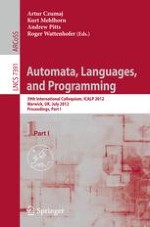2012 | OriginalPaper | Buchkapitel
Streaming and Communication Complexity of Clique Approximation
verfasst von : Magnús M. Halldórsson, Xiaoming Sun, Mario Szegedy, Chengu Wang
Erschienen in: Automata, Languages, and Programming
Verlag: Springer Berlin Heidelberg
Aktivieren Sie unsere intelligente Suche, um passende Fachinhalte oder Patente zu finden.
Wählen Sie Textabschnitte aus um mit Künstlicher Intelligenz passenden Patente zu finden. powered by
Markieren Sie Textabschnitte, um KI-gestützt weitere passende Inhalte zu finden. powered by
We consider the classic clique (or, equivalently, the independent set) problem in two settings. In the streaming model, edges are given one by one in an adversarial order, and the algorithm aims to output a good approximation under space restrictions. In the communication complexity setting, two players, each holds a graph on
n
vertices, and they wish to use a limited amount of communication to distinguish between the cases when the union of the two graphs has a low or a high clique number. The settings are related in that the communication complexity gives a lower bound on the space complexity of streaming algorithms.
We give several results that illustrate different tradeoffs between clique separability and the required communication/space complexity under randomization. The main result is a lower bound of
$\Omega(\frac{n^2}{r^2\log^2{n}})$
-space for any
r
-approximate randomized streaming algorithm for maximum clique. A simple random sampling argument shows that this is tight up to a logarithmic factor. For the case when
r
=
o
(log
n
), we present another lower bound of
$\Omega(\frac{n^2}{r^4})$
. In particular, it implies that any constant approximation randomized streaming algorithm requires Ω(
n
2
) space, even if the algorithm runs in exponential time. Finally, we give a third lower bound that holds for the extremal case of
s
− 1 vs.
$\mathcal{R}(s)-1$
, where
$\mathcal{R}(s)$
is the
s
-th Ramsey number. This is the extremal setting of clique numbers that can be separated. The proofs involve some novel combinatorial structures and sophisticated combinatorial constructions.
